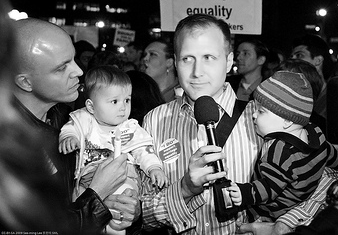
How the children of same-sex couples are affected by state and federal restrictions on marriage is emerging as a consideration for the U.S. Supreme Court as it hears two cases concerning gay marriage this week.
The Supreme Court heard oral arguments yesterday for Hollingsworth v. Perry, a case challenging California’s Proposition 8, a voter initiative passed in 2008 that prohibits gay people in the state from marrying. It was the first time in its history that the Supreme Court took up a case on same-sex marriage.
This morning, the court will hear oral arguments for United States v. Windsor, a case challenging the federal Defense of Marriage Act, which makes it illegal for the federal government to recognize the marriages of same-sex couples even if they are legal in a particular state.
Last week, the National Academy of Pediatrics came out in favor of marriage rights for gay and lesbian couples, saying that after a review of 30 years of research literature, it had concluded that children of same-sex couples showed the same outcomes as those from opposite-sex couples. Children did best when they had two parents who were committed to each other, regardless of gender, the academy said, and the government should not stand in the way of that commitment.
The academy’s endorsement came up implicitly during oral arguments for California’s Proposition 8 when Justice Antonin Scalia questioned the research available on the outcomes for children of same-sex parents.
“They’re arguing for a nationwide rule which applies to States other than California, that every State must allow marriage by same-sex couples,” Scalia said. “And so even though States that believe it is harmful — and I take no position on whether it’s harmful or not, but it is certainly true that — that there’s no scientific answer to that question at this point in time.”
Justice Anthony Kennedy, widely regarded as a deciding vote on a nine-member court otherwise split between liberal and conservative justices, agreed that information on same-sex parents and their children was new. “We have five years of information to weigh against 2,000 years of history or more,” Kennedy said.
But that didn’t change the fact that marriage restrictions on same-sex couples could create “an immediate legal injury” to their children, Kennedy pointed out.
“There are some 40,000 children in California, according to the Red Brief, that live with same-sex parents, and they want their parents to have full recognition and full status. The voice of those children is important in this case, don’t you think?” Kennedy asked Charles Cooper, the lawyer representing opponents of gay marriage in California. The state of California has declined to defend Proposition 8 on the grounds that it is unconstitutional.
Cooper agreed it was important, but argued that there was no evidence that allowing gay marriage would benefit children of same-sex parents.
“There is simply no data at all that would permit one to draw that conclusion,” Cooper said. “In fact, their expert agreed there is no data, no study, even, that would examine whether or not there is any incremental beneficial effect from marriage over and above the domestic partnership laws that were enacted by the State of California to recognize, support, and honor same-sex relationships and their families.”
U.S. Solicitor General Donald Verrilli Jr., arguing for Proposition 8 to be struck down, told the Supreme Court that the court didn’t wait for evidence for life outcomes for biracial children when it allowed people of different races to marry in its ruling for Loving v. Virginia in 1967.
“I think the Court recognized that there is a cost to waiting and that that has got to be part of the equal protection calculus,” Verrilli said. California law harmed the children of same-sex couples by denying children the long-term stabilizing effects of marriage between their parents, he said.
Yet the ability for married people to have children at all was central to Cooper’s arguments against allowing gay and lesbian couples to marry.
Justices Elana Kagan and Stephen Breyer pressed Cooper on his argument that the traditional definition of marriage between a man and woman was based on the social need to procreate. The justices pointed out that infertile couples were allowed to marry, and that gay people were allowed to adopt, in California.
“I mean, there are lots of people who get married who can’t have children. To take a State that does allow adoption and say — there, what is the justification for saying no gay marriage?” Breyer asked. “What precisely is the way in which allowing gay couples to marry would interfere with the vision of marriage as procreation of children that allowing sterile couples of different sexes to marry would not?”
Cooper responded that traditional marriage had always focused on children. “The concern is that redefining marriage as a genderless institution will sever its abiding connection to its historic traditional procreative purposes, and it will refocus, refocus the purpose of marriage and the definition of marriage away from the raising of children and to the emotional needs and desires of adults, of adult couples,” he said.
The court is expected to release its rulings this summer.
The hearings come at a time of rapidly changing social attitudes in favor of allowing gays and lesbians to marry. A transcript of the oral arguments for the California case yesterday show the justices wondering if the Supreme Court had done the right thing by agreeing to hear the case, rather than let public opinion and the political process ultimately determine California’s marriage laws. Justice Sonia Sotomayor wondered aloud if such a democratic process would take “at most, four years.”
A recent CBS poll shows the 53 percent of Americans now support the right of couples of the same gender to marry, with the Pew Forum on Religion and Public Life documenting a double-digit increase in support over 10 years ago. A big part of the shift is occurring because more Americans now report knowing someone who is gay, according to Pew.
In the days leading up to the Supreme Court hearings, a wave of U.S. senators from traditionally conservative states like Alaska, Missouri, West Virginia and Virginia, have announced they now support same-sex marriage.
Though most are Democrats, they include Republican senator Rob Portman of Ohio, who announced he had changed his mind on the issue after his teenage son came out to him as gay.
Photo by See-ming Lee | Flickr































